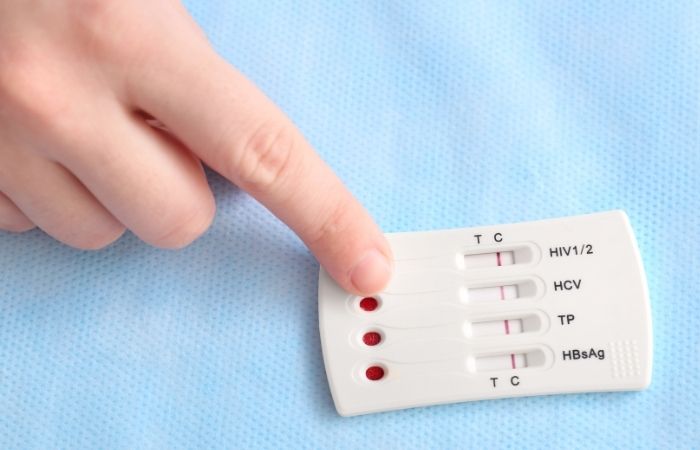STD Symptoms Got Worse After Testing Negative, What Now?
Quick Answer: Recurring STD symptoms can be caused by reinfection, resistant strains, or completely unrelated issues like BV or dermatitis. Always test again to confirm your status.
This Isn’t Déjà Vu, It’s a Red Flag
First: you are not being dramatic. When symptoms come back after treatment, whether it’s itching, pain, discharge, or irritation, your body is telling you something. And while it’s tempting to brush it off as a yeast infection or irritation from shaving, recurring symptoms after an STD treatment can signal:
- Reinfection: You were re-exposed by a partner who wasn’t treated
- Incomplete treatment: The antibiotic didn’t fully eliminate the infection
- Wrong diagnosis: You were treated for the wrong thing (think BV instead of chlamydia, or vice versa)
- Herpes flare-up: A symptom that returns regularly, even years after infection
- Testing window error: The original test was too early, too late, or simply wrong
Let’s get real about what recurring STD symptoms actually mean, and what they definitely don’t.

People are also looking for: Why So Many Georgia College Students Get STDs
“I Got Treated for Chlamydia. Why Am I Still Itchy?”
Ty, 26, got treated for chlamydia after a routine STI panel. He took the antibiotics, waited the full week, and used condoms like clockwork. But two months later, the urethral itching returned, and he started to spiral.
“I thought maybe it was soap, or maybe I’d gotten something worse. I was scared to even ask a doctor again, like they’d think I was lying or dirty.”
Ty's follow-up test was negative. Turns out, the irritation was from chronic post-infectious inflammation, not a new infection at all. This is incredibly common and deeply under-discussed. Even after successful treatment, the body’s tissues can take weeks or months to fully calm down.
And yes, sometimes recurring symptoms don’t mean reinfection, but residual healing.
One of the most confusing patterns people report is this: symptoms go away, everything seems fine, and then a few weeks (or months) later, they return. This is especially true with:
- Herpes: Latent virus that reactivates with stress, illness, or even hormone changes
- Chlamydia: Often silent, and may resurface if not fully cleared or if reinfected
- Trichomoniasis: Can persist despite symptoms fading between flares
- BV or yeast: Often mistaken for STDs, but frequently recur after sex, antibiotics, or pH shifts
One Reddit user put it bluntly: “It was like playing symptom roulette every time I hooked up, even if I tested clean.” That anxiety is real. And if you’ve been treated, but not retested, you might still be walking around with questions. Or worse, your partner might be. Testing again doesn’t mean you don’t trust the first result, it means you trust your body.
Not Everything That Itches Is an STD, But Some Things Are
Let’s bust a dangerous myth: just because something feels “like last time” doesn’t mean it is. Itching, burning, irritation, or discharge can come from dozens of causes, especially in people with vulvas. Here’s how common misdiagnoses play out:
- Recurring yeast infection: Actually HSV-2 with internal sores mistaken for irritation
- BV that won’t go away: Actually trichomoniasis missed on early screening
- Shaving rash: Actually genital herpes during initial outbreak
- UTI symptoms: Actually chlamydia or gonorrhea affecting the urethra
Self-diagnosis is human, but it’s risky. Especially when your symptoms are recurring in a pattern. The most reliable way to know? Test again, and test right. Take control of your sexual health today. This combo at-home STD test kit can check for multiple infections at once, privately and quickly.
When It’s Not Coming Back, It Never Left
One of the hardest truths? Sometimes that “new” symptom is the same infection you thought was gone. Certain STDs, especially gonorrhea, chlamydia, and trichomoniasis, can linger silently if treatment didn’t fully work, or if a partner wasn't treated at the same time.
If you had unprotected sex within a few weeks after treatment, or if your partner never got tested, you may be facing a reinfection. This doesn’t mean the meds failed or you did anything wrong. It means your care needs to match your risk, and that includes retesting when needed.
- Wait 7 days after antibiotics before resuming sex
- Retest 3 months later for chlamydia, gonorrhea, and trich
- Test your partners even if they don’t have symptoms
Think of it like closing a loop, if one person gets tested and treated, but the other doesn’t, the cycle continues.
The Testing Trap: False Negatives and Misleading Results
Let’s talk about the thing no one wants to admit: STD tests aren’t perfect. Timing matters. Technique matters. Even the test type matters.
Plenty of people have gotten a negative result, only to retest later and learn the infection was there all along. How does this happen?
- Window periods: You tested before the infection was detectable
- Sample site error: The test missed the infection because it wasn’t swabbed where symptoms were
- Low viral load: Especially in early herpes or asymptomatic infections
Take oral herpes for example. It may not be caught unless you swab the throat. The same goes for rectal chlamydia or gonorrhea, especially in queer and trans folks whose anatomy or behavior is often ignored in standard testing panels.
If your test came back negative but your symptoms returned, it’s not in your head. It might just be in the wrong body part, or missed entirely. Peace of mind is one test away. Order your STD test today and know where you really stand.

People are also reading: Condoms Cover Genitals, Not Everything Else: The Skin-to-Skin STD Problem
Herpes: The Symptom That Won’t Stay Gone
If your symptoms flare up the same way, same place, again and again, herpes might be the real culprit. And here’s the kicker: most people don’t know they have it. Many don’t even get tested for it unless they ask.
Recurring symptoms of herpes may include:
- Itchy or tingling skin before an outbreak
- Small sores or blisters, often mistaken for razor burn
- Red patches or swelling
- Painful urination (especially in vulva owners)
And herpes doesn’t always look like the textbook photo. Sometimes it's just internal discomfort, nerve tingling, or a single tiny bump. It can show up without sex, during periods, after stress, or for no clear reason at all.
“I had an ‘STD scare’ every few months for years,” one user wrote. “Turned out, it was herpes the whole time, but it never looked like what I thought it would.”
That’s the heartbreak of recurring symptoms. You think you're crazy. But your body’s trying to speak.
Recurring Vaginal Itching: When It’s Not BV or Yeast
Many people with vaginas live in a constant rotation of BV, yeast, and general irritation. But here’s the problem: those symptoms overlap heavily with STIs, and doctors often guess based on symptoms alone.
Let’s break it down:
- Yeast: Itchy, thick discharge, no smell
- BV: Thin, greyish discharge with a strong odor
- Trichomoniasis: Itchy, greenish-yellow discharge, sometimes frothy
- Chlamydia or gonorrhea: Subtle, with mild itching or unusual discharge
If you’ve been treated for yeast or BV multiple times and the itch always comes back, it’s time to test for something broader. Many people discover they’ve been carrying trich for months or longer, mistaking it for something else.
Let’s name the real reason people stay stuck in cycles of symptoms and shame: stigma. Recurring STD symptoms aren’t just uncomfortable, they’re emotionally exhausting. Especially when you’ve “done everything right” and still feel like something’s wrong.
Many people delay getting retested because they:
- Don’t want to explain it to a new partner
- Assume doctors will think they’re irresponsible
- Are afraid they’ll be “that person” with an STD that won’t go away
You are not dirty. You are not broken. You are not alone.
STDs can recur for all kinds of reasons that have nothing to do with who you are. Some, like herpes, literally live in your body forever. Others, like trich or chlamydia, can hide in asymptomatic partners and bounce back to you again and again.
“Every time I told someone I was itching again, I felt like I was admitting something shameful,” says Ellie, 29. “But honestly? The silence was way worse than the infection.”
How Long Is Too Long? STD Symptoms Over Time
One of the most Googled phrases we see is: “Can STD symptoms come back after months or years?”
The answer depends on the infection. Here’s a breakdown of common recurrence timelines:
- Herpes: Can reactivate anytime, weeks, months, or even years later
- HPV: May clear and come back under immune stress (not always detectable)
- Chlamydia: Usually gone after treatment, but reinfection can happen quickly
- Gonorrhea: Symptoms typically resolve after antibiotics, but drug-resistant strains exist
- Trichomoniasis: Often recurs if partner wasn’t treated (very common in cisgender women)
If your symptoms disappeared for a while and then returned, don’t assume your body is betraying you. It could be:
- A partner wasn’t treated or was re-exposed
- Your immune system allowed a flare-up
- You were misdiagnosed originally
The bottom line? Time doesn’t always mean you’re “in the clear.” Retesting is the only way to know if you’re still carrying something, or if your symptoms mean something new.
Talking to Partners When You’re Not Even Sure Yourself
What do you say to someone when you’re itching again, but not sure if it’s an STD, or something else entirely?
Here’s a script you can use that’s honest, calm, and stigma-free:
“Hey, I’ve been feeling off again and I’m not sure what’s going on. I’m going to get tested just to be safe, I’d really appreciate if you could too, just to close the loop.”
This isn’t an accusation. It’s harm reduction. Most people don’t realize they can carry and transmit STDs with no symptoms at all. So if you’re the one with symptoms, you’re the brave one bringing it up, and possibly protecting both of you.
Show up for your partner with confidence. Testing is care, not shame.
If you've gone through the full cycle, testing, treatment, symptom relief, then recurrence, you're probably stuck in what we call the confusion zone.
Here’s what to do:
- Don’t self-diagnose: Even if it “feels like last time,” symptoms can overlap
- Get a full-panel test: Especially if you’ve only tested for one or two infections
- Talk to your provider about herpes or trich testing: These are not always included in routine STI panels
- Track your symptoms: Write down timing, triggers, and locations
Your symptoms are valid, even if your test says negative. But testing again is still your clearest path forward.
End the guessing game, know your status now.

People are also reading: Condoms Cover Genitals, Not Everything Else: The Skin-to-Skin STD Problem
FAQs
1. Why am I itchy again after getting treated for an STD?
Could be a few things: a reinfection, an irritated healing site, or maybe it was never an STD in the first place (yeast, BV, dermatitis, lots of contenders). Your body isn’t glitching. It’s asking for a second opinion. Testing again = self-respect, not paranoia.
2. Does herpes really keep coming back forever?
Yep. Herpes is like that ex who never fully disappears, usually shows up when you’re stressed, sick, or on your period. Sometimes it tingles. Sometimes it burns. Sometimes it’s just a vibe. Recurring doesn’t mean contagious 24/7, but it does mean it’s still there.
3. I got treated for chlamydia. Why do I still feel off?
Two words: reinfection or misdiagnosis. If your partner didn’t get treated, you might’ve caught it again. Or maybe you got treated for chlamydia, but it was actually trich the whole time (super common mix-up). A full-panel retest is your best friend here.
4. My symptoms came back months later. Is that normal?
Totally. Especially for herpes, HPV, and even trich. Some STIs are sneaky and can flare up long after you think they’re gone. Don’t assume you’re “clear” just because it’s been a while. If it came back, test like it never left.
5. Can BV or yeast infections cause STD-like symptoms?
Oh, 100%. Burning, discharge, odor, irritation, classic overlap. The problem? They can exist alongside actual STDs. You could have both. You could also be treating the wrong one over and over. That’s why guessing doesn’t work, only testing does.
6. What if my STD test came back negative, but I still have symptoms?
Been there. Could be a false negative, especially with herpes (you need a sore swabbed within 48 hours). Or maybe the test didn’t check all the places, oral, anal, vaginal, it matters. A test can miss the target if it’s aimed wrong.
7. How do I bring this up with a partner without sounding like I’m blaming them?
Try this: “Hey, some symptoms came back and I’m planning to get tested again. Would you feel comfortable doing that too, just to rule stuff out?” It’s not about blame, it’s about having each other’s backs. Normalize that talk like you normalize lube.
8. Can I still test at home if this keeps happening?
Yes, and honestly, it might feel safer. No awkward waiting room, no “how many partners” questions. Just you, your sample, and your results. A combo test kit covers the most common culprits in one go. Fast, private, and judgment-free.
9. Should I be worried this means something serious?
Worried? Maybe. Panicked? No. Persistent or returning symptoms don’t always mean danger, but they do mean something’s unresolved. It could be as simple as needing a different treatment, or as complex as herpes you never knew you had.
10. How do I know if I need to test again?
Simple: if your symptoms are back, your peace of mind is gone, or your gut says something’s off, you test again. You don’t need permission, proof, or panic. Just curiosity and care. That’s it.
You Deserve Answers, Not Assumptions
If your symptoms keep coming back, that doesn’t make you reckless, it makes you human. STDs can hide, resurface, or get mistaken for other conditions. The only way to get clarity is through testing, care, and open conversation. This at-home combo test kit checks for the most common STDs discreetly and quickly.
Sources
1. Can Chlamydia and Other STIs Come Back After Treatment? – Verywell Health
2. Syndromic Management of Sexually Transmitted Infections – PAHO
3. STDs That Cause Itching: What to Know – Medical News Today
4. Itchy Genitals: Causes, Types & Treatment – Cleveland Clinic
5. Trichomoniasis – Wikipedia (Symptoms & Recurrence)
6. STIs: Updates From the 2021 Guidelines – American Family Physician







